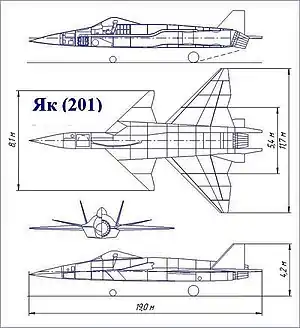Yakovlev Yak-201
The Yakovlev Yak-201 is a draft follow-up to the vertical takeoff and landing aircraft Yak-141 aircraft and Yak-43.[1] The design was carried out in the mid-1990s Yakovlev Design Bureau.[2]
| Yak-201 | |
|---|---|
 | |
| Role | fifth generation stealth VSTOL fighter |
| National origin | Russia |
| Manufacturer | Yakovlev |
| Designer | Yakovlev |
| Status | Project only |
| Primary user | Russian Naval Aviation |
| Number built | None |
Design
The aircraft was supposed to differ from Yak-141 / Yak-43 by an increased range. The aircraft is made according to the traditional scheme with two-tails, and a large angle of inclination. The plane is relatively stealthy, with few right angles.[3]
The design was for a single lift-propulsion motor with a mechanical drive to a lifting fan installed behind the cockpit. The nozzle of the main engine was supposed to be vectorable. Flat and round nozzle options were considered. The ability to change the thrust vector makes the aircraft move manoeuvrable. The armament was to be placed in an internal weapon bay inside the fuselage. However, the project was never built.
In 1996–1997, the aircraft was offered to the customer, but the project remained unclaimed, primarily for financial reasons, and also due to the lack of certainty of the Ministry of Defense under the LFI program. After the Yak-141 and Yak-43 were developed, the engineers from the Yakovlev Design Bureau proceeded to the Yak-201. No layout or an experienced prototype was. The design was started on an initiative basis by the bureau officers in the mid-1990s.[4]
The aircraft was expected to reach a speed of 1250 km / h near the ground, and climb to an altitude of 1800 km / h. The practical ceiling for the Yak-201 is 15,000 m. Among the armament, it was decided to use a GSh-301 rifle cannon with 120 rounds of ammunition, and to install air-to-air type R-77 long-range or medium-range at four points of suspension. The installation of short-range missiles R-73 and R-60 and NAR units with a caliber of up to 240 mm were worked out.
Notes
References
- https://www.simpleplanes.com/a/2AUquN/YAK-201
- "Yak-201". www.globalsecurity.org. Retrieved 30 December 2018.
- https://avia-pro.net/blog/yak-201
- https://avia-pro.fr/blog/yak-201